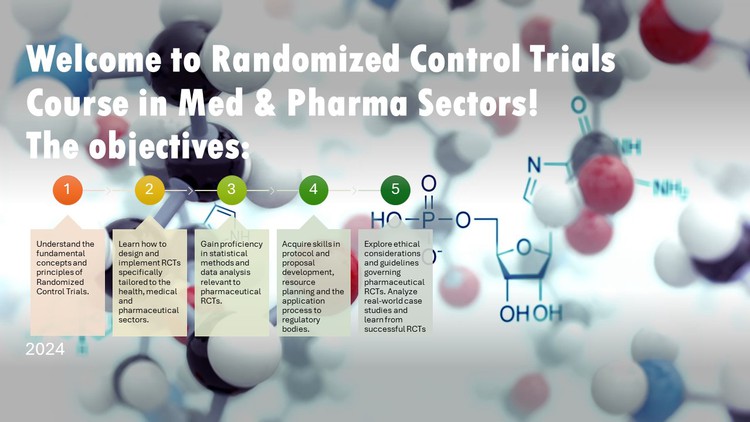
Mastering RCTs in Health Research: A Comprehensive Guide for Health, Medical and Pharmaceutical Professionals
What you will learn
Understand the fundamental concepts and principles of Randomized Control Trials.
Learn how to design and implement RCTs specifically tailored to the health, medical and pharmaceutical sectors.
Gain proficiency in statistical methods and data analysis relevant to pharmaceutical RCTs.
Acquire practical skills in protocol development, participant recruitment, and daExplore ethical considerations and guidelines governing pharmaceutical RCTs.
Analyze real-world case studies and learn from successful RCTs in the pharmaceutical industry.
Description
Course Overview: This course provides an in-depth exploration of Randomized Control Trials (RCTs) within the context of the health, medical and pharmaceutical sector. Participants will gain a comprehensive understanding of the principles, methodologies, and ethical considerations involved in designing, conducting, and analyzing RCTs in pharmaceutical research.
Course Duration: 8 Units (16 sessions)
Course Outline:
Unit 1-2: Introduction to RCTs
• Definition and characteristics of RCTs
• Historical context and evolution
• Advantages and limitations
• Overview of pharmaceutical RCTs
Unit 3-4: Designing Pharmaceutical RCTs
• Formulating research questions and hypotheses
• Eligibility criteria and participant selection
• Randomization methods
• Blinding and placebo controls
• Sample size calculation
Unit 5-6: Statistical Methods and Data Analysis
• Basic statistical concepts
• Analysis plan for pharmaceutical RCTs
• Interpretation of results
• Handling missing data and biases
Unit 7: Ethical and Quality Considerations in Pharmaceutical RCTs
• Informed consent process
• Ethical guidelines and regulations
• Balancing benefits and risks
• Ensuring participant confidentiality and safety
Unit 8: Practical Implementation and Case Studies
• Protocol development and review
• Participant recruitment and retention
• Data collection and management
• Case studies of successful pharmaceutical RCTs
Unit 09: RCT Budgeting and Financing
Unit: RCT Reporting and Publication
Prerequisites:
• Basic understanding of clinical research
• Familiarity with statistical concepts (recommended)
Materials:
• Textbooks and research articles
• Statistical software (e.g., R, SAS)
• Ethical guidelines and regulatory documents
Certification: Participants who successfully complete the course, including the final project, will receive a Certificate of Completion in a Randomized Control Trial for the Pharmaceutical Sector.
This syllabus provides a structured framework for learning and applying RCT principles within the pharmaceutical industry, preparing participants for effective research design and implementation in this specialized field.
al sector. Participants will gain a comprehensive understanding of the principles, methodologies, and ethical considerations involved in designing, conducting, and analyzing RCTs in pharmaceutical research.
Content